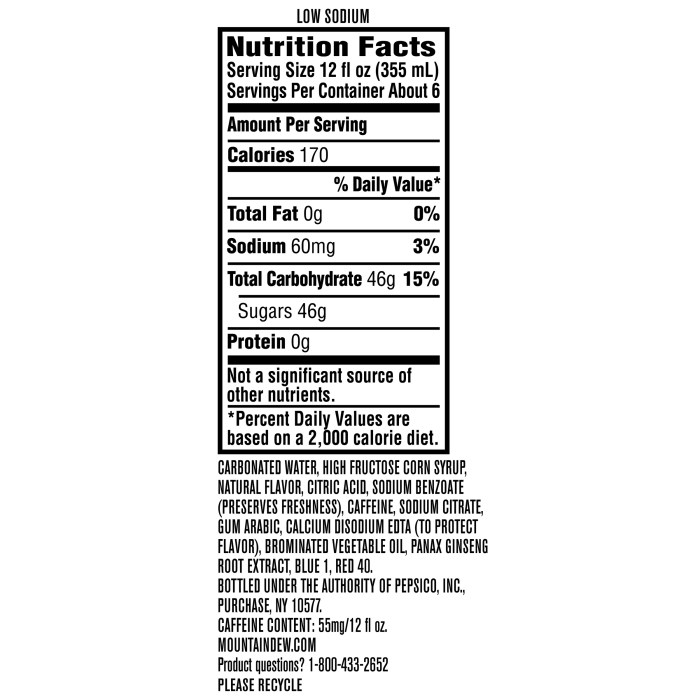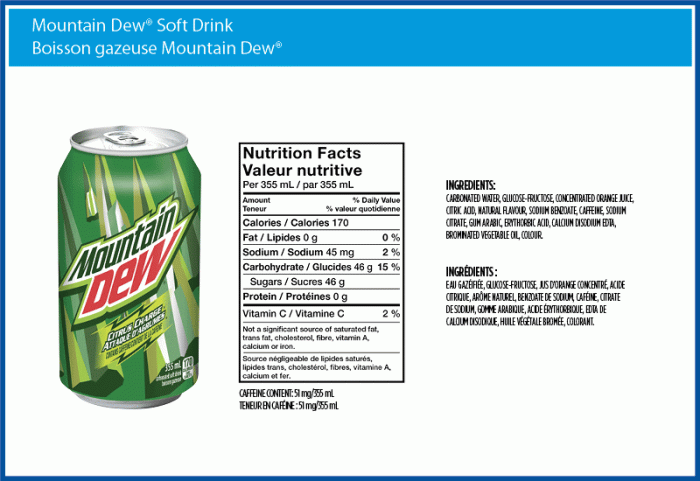Health Implications of Mountain Dew Consumption: Nutrition Facts Mt Dew

Nutrition facts mt dew – Mountain Dew, with its vibrant green color and intensely sweet taste, is a popular soda, but its high sugar content and caffeine levels raise significant health concerns. Regular consumption can lead to a range of negative impacts on various aspects of health, from blood sugar control to dental health and weight management. Understanding these potential consequences is crucial for making informed choices about beverage intake.
Effects on Blood Sugar Levels
The high sugar content in Mountain Dew, primarily from high-fructose corn syrup and sucrose, causes a rapid spike in blood sugar levels after consumption. This rapid increase overwhelms the body’s ability to process the glucose efficiently, leading to insulin resistance over time. Chronic consumption contributes to the development of type 2 diabetes, a serious condition characterized by the body’s inability to regulate blood sugar effectively.
Individuals with pre-existing conditions like diabetes or those at risk should be particularly cautious about their Mountain Dew intake. For example, a single 20-ounce bottle of Mountain Dew contains approximately 77 grams of sugar, which is far above the recommended daily intake for added sugars. This sugar rush, followed by a crash, can lead to energy fluctuations, impacting mood and focus throughout the day.
Understanding the nutritional content of beverages is crucial for maintaining a balanced diet. While Mountain Dew’s nutrition facts highlight its high sugar and caffeine content, a contrasting perspective can be gained by examining the macronutrient profile of protein-focused drinks such as those detailed in the comprehensive guide on muscle milk nutrition facts. This comparison underscores the significant differences in nutritional value between carbonated soft drinks and protein supplements, ultimately informing healthier beverage choices related to the nutrition facts of Mt Dew.
Impact on Dental Health
The high sugar content in Mountain Dew significantly contributes to dental problems. The sugars feed the bacteria in the mouth, producing acids that erode tooth enamel, leading to cavities and gum disease. The acidity of Mountain Dew further exacerbates this process, weakening the enamel and making teeth more susceptible to decay. The dark color of the soda can also stain teeth over time.
Regular consumption of sugary drinks like Mountain Dew, without proper oral hygiene, significantly increases the risk of developing serious dental issues requiring extensive and costly treatment. Consider the example of someone consuming multiple Mountain Dews daily; the cumulative effect of the sugar and acid on their teeth would be substantial, potentially leading to premature tooth loss.
Relationship Between Mountain Dew Consumption and Weight Management
Mountain Dew’s high sugar and calorie content directly contributes to weight gain. The empty calories in the soda provide little to no nutritional value, yet they significantly increase overall caloric intake. This excess energy, if not burned through physical activity, is stored as fat, leading to weight gain and potentially obesity. Obesity, in turn, increases the risk of numerous health problems, including heart disease, stroke, and certain types of cancer.
For instance, a 20-ounce bottle of Mountain Dew contains approximately 250 calories, which, if consumed regularly in addition to a typical diet, can easily contribute to a significant calorie surplus leading to weight gain. Furthermore, the high sugar content can also lead to increased cravings for sugary and processed foods, further contributing to unhealthy eating habits and weight management difficulties.
Alternative Beverage Options

So, you’re ready to ditch the Mountain Dew and opt for something a little healthier? Great choice! There are tons of delicious and hydrating alternatives out there that won’t leave you with a sugar crash and jitters. Let’s explore some better options.
Choosing healthier beverages is a key step in improving your overall diet and well-being. Swapping sugary sodas for options lower in sugar and calories can significantly impact your energy levels, weight management, and even your dental health. Remember, hydration is crucial, and there are plenty of tasty ways to stay properly hydrated throughout the day.
Healthier Beverage Alternatives
Here’s a table comparing some healthier beverage choices to Mountain Dew. Serving sizes and nutritional information can vary by brand, so always check the label.
| Beverage Type | Example | Calories per Serving (8 oz) | Sugar Content (grams) |
|---|---|---|---|
| Water | Plain water, Sparkling water | 0 | 0 |
| Fruit Juices (100% Juice) | Orange juice, Grapefruit juice | ~110-150 | ~20-25 |
| Unsweetened Iced Tea | Brewed tea, chilled | 0-5 | 0 |
| Sports Drinks (Low Sugar) | Gatorade Zero, Powerade Zero | 0-10 | 0 |
| Milk (Skim or Low-Fat) | Skim milk, Almond milk (unsweetened) | ~80-100 | ~10-12 |
Sample Daily Hydration Plan, Nutrition facts mt dew
This sample plan shows how to incorporate healthier drinks throughout your day. Adjust portion sizes to meet your individual needs and activity levels.
- Morning: 16 oz of water with lemon
- Mid-morning: 8 oz of unsweetened iced tea
- Lunch: 8 oz of water
- Afternoon: 8 oz of low-sugar sports drink (after a workout)
- Evening: 16 oz of water
Visual Comparison: Mountain Dew vs. Sparkling Water with Lemon
Imagine two glasses side-by-side. One contains Mountain Dew: a vibrant, almost neon green liquid, completely clear and translucent. The other holds sparkling water with a squeeze of lemon: a colorless, clear liquid with tiny bubbles visible throughout. A few thin lemon slices might rest at the bottom. The difference is stark – one is artificially colored and loaded with sugar, the other is naturally refreshing and calorie-free.
Questions Often Asked
What are the long-term effects of excessive Mountain Dew consumption?
Excessive consumption can contribute to weight gain, type 2 diabetes, dental problems, and other health issues due to its high sugar and calorie content.
Is Mountain Dew suitable for children?
Due to its high sugar and caffeine content, Mountain Dew is not recommended for children. Healthier alternatives are preferable.
Does Mountain Dew contain any vitamins or minerals?
While Mountain Dew contains trace amounts of some vitamins and minerals, these are insignificant compared to its negative nutritional aspects.
Are there diet versions of Mountain Dew?
Yes, diet versions exist, but they often contain artificial sweeteners which some individuals may find problematic.
